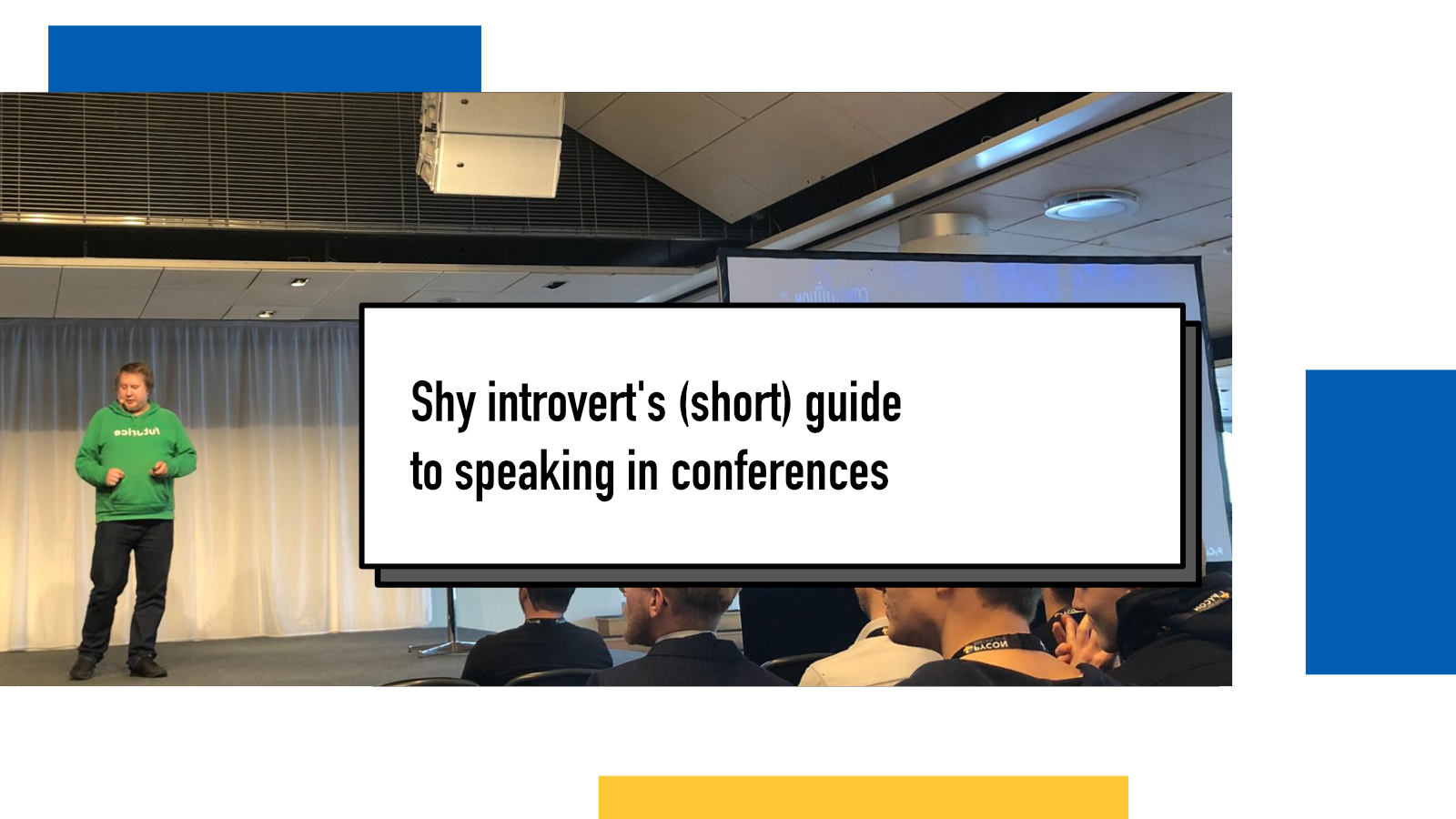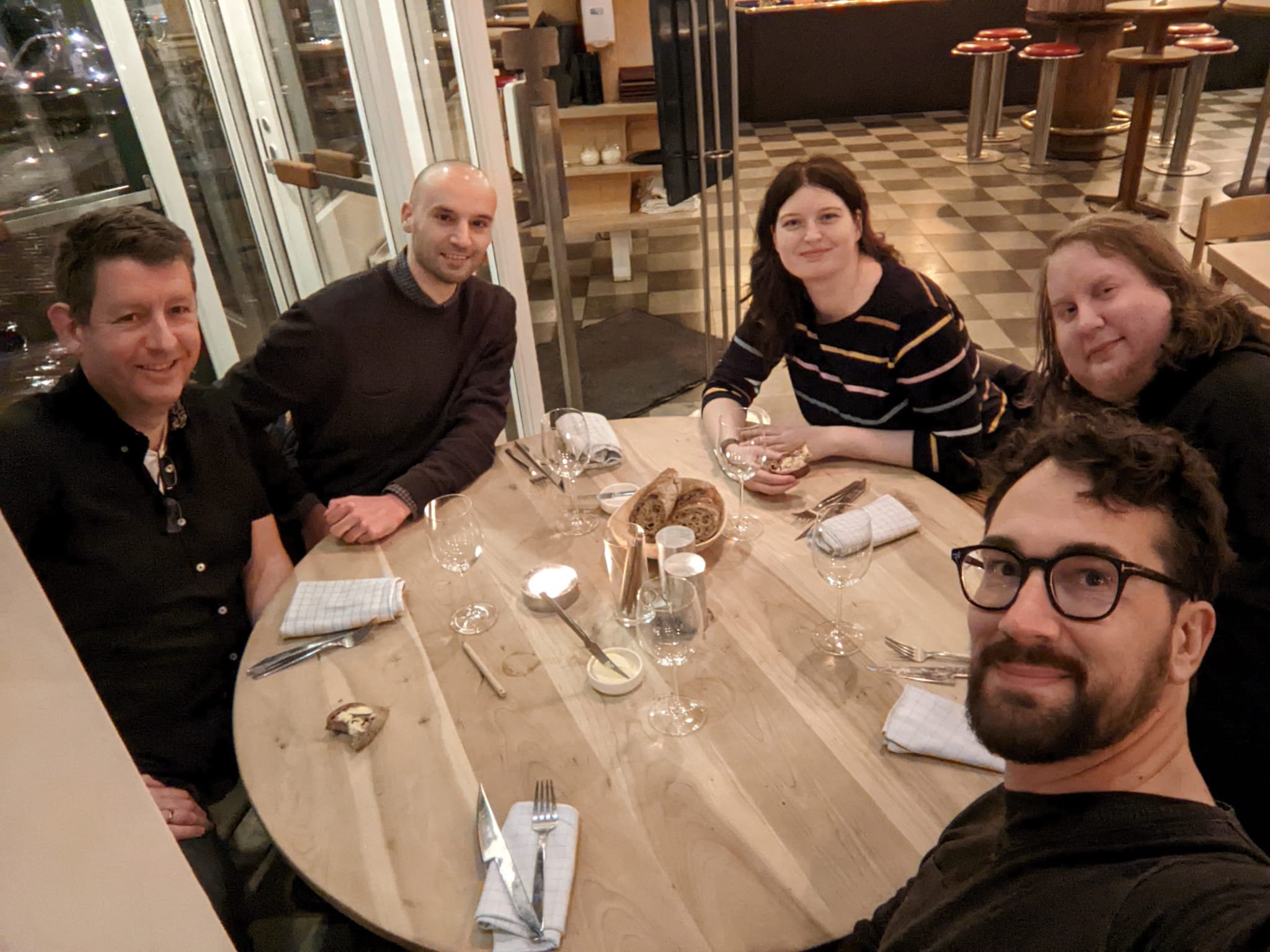Shy introvert's (short) guide to speaking in conferences

I'll let you in on a personal secret: every time I go to speak in an event, I get so nervous. Especially the last 10-15 minutes before my turn to take the stage, I'm terrified.
Under all the learned small talk and nervousness-hiding skills, deep down I'm very shy and introverted and find it difficult to talk to strangers. Somehow, despite all that, I've ended up in a role both at work and at hobbies where I meet with hundreds of people every month and speak to audiences on a stage weekly. So I had to learn how to make it bit easier to meet people and get on stage on conferences.
As I was originally writing this, I was sitting in the railway station of Stockholm on the way to Django Day Copenhagen to speak. That means it took me few weeks to finish the post after the conference.
Tip 1: Get to know people before event
One thing I love to do during the weeks and days leading into the conference is to be active to chat with fellow participants and speakers. Often conferences have chat platforms like Slack/Discord/Zulip/Telegram that you can join. I'm very comfortable chatting with people in written form so I tend to be active in those before the event. When I was travelling to Pycon CZ in 2019, I got to know a lot of people so when I eventually arrived to Ostrava, a fellow speaker came to talk to me on the street as I was walking to my hotel. That was awesome.
Right now on my way to Django Day, I've been posting pictures and updates from my travel to the event: from the Helsinki-Stockholm ferry, from the Stockholm station and so on. And it has encouraged others to do the same. I think it brings a lovely vibe to the community when you see others make their way to the event city.
If there's no such chat platform offered, look up fellow speakers from Twitter and reach out.
I also love to set up a dinner for the night before if one is not organized by the event. Sometimes it's just 2 people who show up, sometimes it's more. Regardless, it's a great opportunity to make a few more friends leading up to the event.

Before Django Day Copenhagen, we got together with these four fellow speakers and became friends the night before the event. It made it so much easier to go to the conference the other day when I already knew some people!
Tip 2: Get to know people at the event before your talk
The time leading up to your talk is nervous and many people like to stay away from people to practice. What I like to do is spend my conference day making friends. Before the talks, during breakfast, during breaks and lunch, I try to find people to talk with. Especially great if I can find groups with some people I made friends with before the event that I can ease my way into the discussion through someone I know.
This advice is easy to write but hard to execute for a shy introvert. Sometimes I succeed, sometimes the anxiety gets the best me and I end up not doing it.
One thing I did in PyCon Sweden in 2019 was that as the first day was coming to a close, I walked around the venue inviting random people for a dinner and we ended up with a group of 8 and had lovely dinner getting to know each other.
Both of these lead towards one goal: instead of speaking to strangers, by the time my talk starts, I'm talking to friends. And speaking to friends is so much easier than to strangers.
Tip 3: Do a practice run in a local meetup
No matter if you're a first-time speaker or an experienced speaker with a new talk, practice makes perfect. Local meetups, user groups and lunch'n'learn sessions at work are great places to do practice runs for a conference talk.
Reach out to the local groups in your area and let them know you have a conference talk that you'd like to perform in their meetup as well. My personal experience is that I discover a thing or two when I do the first full run of my talk so every run not only improves my presentation skills and lowers the stress but also makes the content better.
The best advice I've ever gotten for becoming better at doing talks and presentations is this: "Record your talks – not to spot the mistakes but to make sure you capture the things that went really well so you have a recording and can write them down for future runs."
At my job, I'm lucky that we have Tech Weeklies – a weekly internal meetup for developers to share what they know and have learned. I've done a few practice runs in those over the years and it's been invaluable. If you want to set up something similar in your company or team, I've written a bit about how it works in a blog post.
Tip 4: Read a book
This is more of a general tip that I want to share. Dale Carnegie's How to Win Friends and Influence People has a rather off-putting name but for me, it's been one of the key books I've read that taught me how to be a bit more social and find ways to do small talk even when it doesn't come to me naturally.
It's also a rather short book and has very practical tips and examples so I aim to read it at least once a year. Out of all books I've ever read, this one has had by far the biggest impact in my professional and personal life.
Another book of the similar content is Keith Ferrazzi's Never Eat Alone that was equally life-changing for me when I read it late 2014.
Tip 5: Take care of yourself
For me, the best part of any conference and main reason for me to participate in those is to meet people. But it can sometimes get overwhelming. Here's the big reveal: it's okay to take some personal time and space. Go for a walk, take a nap or just sit in the corner and watch talks.
For Django Day Copenhagen, I had big plans for the post-conference day on Saturday but when I woke up, I remembered that being active socially and literally talking with people from early morning to midnight takes a toll. So I let people know I'm taking a self-care day and only went out later in the evening for dinner after feeling a bit better (and after evacuating the hotel for fire alarm).
I think there's a lot of unspoken, imagined conference etiquette that doesn't really exist. You don't literally need to sit through every talk and then feel exhausted and fly home. For a smaller event, I tend to watch most talks but especially for a larger multi-day conference, I pick the ones that are most interesting and spend rest of the time either hanging out with people in the hallways, going for a walk or taking some me-time.
If something above resonated with you, let's start a discussion about it! Email me at juhamattisantala at gmail dot com and share your thoughts. This year, I want to have more deeper discussions with people from around the world and I'd love if you'd be part of that.